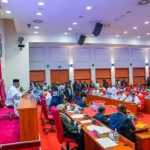The Senator representing Kogi Central District, Natasha Akpoti-Uduaghan, officially resumed duties at the National Assembly on Tuesday after completing a six-month suspension imposed by the Senate earlier this year.
Her return coincided with the resumption of plenary after a ten-week recess, as the Deputy Senate President, Barau Jibrin, presided over the day’s session in the absence of Senate President Godswill Akpabio. The plenary marked a significant moment for the upper legislative chamber, drawing attention from both political observers and the public.
Akpoti-Uduaghan’s reappearance in the Red Chamber effectively ended months of controversy surrounding her suspension, which had generated widespread discussions among Nigerians about legislative discipline and gender representation in politics.
Okay News reports that the senator was suspended in March 2025 for alleged misconduct during a protest against the reassignment of her Senate seat on February 20, 2025. The action, which drew national attention, led to her office—located in Suite 2.05 of the Senate Wing—being sealed off on March 6, 2025.
Following persistent debates and calls for fair treatment from her supporters, the office was eventually reopened by the Deputy Director of the National Assembly Sergeant-at-Arms, Alabi Adedeji. The decision paved the way for her official reinstatement and participation in legislative business.
While addressing journalists after regaining access to her office two weeks ago, Akpoti-Uduaghan had openly criticized Senate President Godswill Akpabio, describing him as a “dictator.” The comment stirred renewed conversations about leadership style and internal democracy within Nigeria’s legislative system.
Observers noted that Akpabio was notably absent during Tuesday’s session, though his absence did not stop the plenary from recording a full turnout of lawmakers, signaling a return to normal parliamentary proceedings.
Political analysts say Akpoti-Uduaghan’s comeback symbolizes resilience in the face of political adversity and might reenergize discussions about transparency, accountability, and gender balance in Nigerian politics.
Her supporters, especially in Kogi Central, have hailed her return as a “victory for democracy,” emphasizing her courage in challenging institutional authority while upholding her mandate as an elected representative.
With legislative activities back in full swing, attention now shifts to how Akpoti-Uduaghan will reintegrate into Senate committees and national deliberations, especially amid ongoing debates over constitutional reform and national security.




